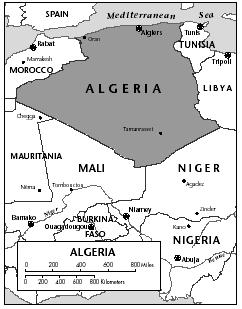Algeria - Political background
Algeria gained its independence from France in 1962, following a long and bitter struggle. The National Liberation Front (Front pour la Libération Nationale—FLN) led that struggle and dominated Algerian politics for the next three decades. From 1965 to 1978, under President Houari Boumedienne, Algeria engaged in a socialist development strategy that focused on heavy industries. The state controlled all natural resources, nationalized foreign assets, used centralized economic planning, and created a large public sector. This strategy achieved some positive results in economic growth, employment, education, health, and other services. However, by 1979, its negative effects started appearing, including a bloated bureaucracy, distribution bottlenecks, rampant inflation, major structural dislocations, growing income inequality, and very poor agricultural performance, which, in turn, stimulated urban migration and food scarcity. Moreover, citizens grew dependent on the state for almost every need without necessarily being required to be productive. The nation faced two significant challenges: a deep economic crisis and violent civil conflicts led primarily by Islamist militants. Several factors contributed to this situation, including the failure of the development strategy, the authoritarian nature of the government, and the rise of a very powerful Islamist movement.
After Boumedienne's death, his successor, Chadli Benjedid, responded to the economic crisis with mostly ad hoc and illcoordinated reform measures that were driven more by political imperatives than economic rationality. The power of the only legal political party in Algeria, the FLN, was increased while the sphere of political expression was curtailed further. The reforms failed to halt economic deterioration, not only because of their inadequate nature, but also because of resistance among workers, conservative elements of the ruling elite, and managers of the public sector. The sharp drop in oil prices in 1986, which translated into a 42% drop in Algeria's oil revenue, made economic revival almost impossible. This in turn aggravated the social problems and increased people's resentment against the state and its leaders. In the first week of October 1988, major youth riots shook the country and led to the fiercest repression ever, with the resulting deaths of some 500 people.
Following the tragic events of October 1988, the constitution was amended to permit a multiparty system. Within months, several political parties and independent associations were born. The most important ones were those affiliated with the Islamist movement, headed by the Islamic Salvation Front (Front Islamic du Salut—FIS), which based its appeal on a plan to establish an Islamic republic governed by the shari'ah (Islamic law). The FIS became the main opposition party and won the most seats in the nation's first multiparty municipal elections of June 1990. In the first round of parliamentary elections of December 1991, it captured 188 out of 430 seats while the ethnically-based Front of Socialist Forces (Front des Forces Socialistes—FFS) obtained 25 seats. The FLN captured a mere 15 seats. Between the two elections, the Islamist challenge grew even bigger and led to a violent showdown with the army. Thousands of people were arrested, including the two FIS leaders, and a state of emergency was instituted in the summer of 1991. In January 1992, the army canceled the parliamentary elections, pushed President Benjedid to resign, banned the FIS, and put the formal reigns of the country in the hands of a High State Council. The FIS responded to these developments by staging an armed rebellion that lasted for many years and caused the deaths of more than 100,000 people.
In the midst of an intricate and violent political stalemate, economic redress became even more difficult and pushed Algeria to agree to an International Monetary Fund (IMF) structural adjustment program as a condition to the debt rescheduling the country needed. By the end of May 1994, Algeria was also engaged in a new series of political reforms. After attempts at dialogue with the jailed FIS leaders failed, the state turned to a firmer repression of radical Islamists and overtures toward moderate opposition parties—both Islamist

and secular. In January 1995, most opposition parties (including the banned FIS) met in Rome and agreed on a national platform for resolving the crisis, but the government rejected it. A multiparty presidential election was held later that year, and incumbent General Liamine Zeroual won by 61% of the vote. A new political party, the National and Democratic Rally (Rassemblement National pour la Démocratie—RND), was created to support his candidacy. In 1996, a constitutional amendment was introduced. It reconfirmed Islam as the state's religion, prohibited parties based on "religious, linguistic, racial, gender, corporatist or regional" grounds, and reinforced the powers of the president. A second parliamentary chamber, the Council of the Nation, was created. New parliamentary elections held in June 1997 resulted in Algeria's first multiparty Parliament. The main winners were RND, FLN, and the moderate Islamist parties, Movement of Society for Peace (Mouvement de la Société pour la Paix—MSP) and al-Nahda (Renaissance). The RND and the FLN constituted a progovernment coalition that controlled an absolute majority and seven ministerial posts each. The Islamists were also awarded seven posts.
Economic and security conditions continued to worsen, and thousands of people were killed. The Islamist violence widened and new organizations, mainly the Armed Islamic Group (GIA) and the Army of Islamic Salvation (AIS), engaged in a series of killings. Their victims were not only military and police personnel, but also civilians and foreigners. The state countered with measures that left scores dead and thousands jailed. It was in this context that Zeroual decided in the fall of 1998 to resign from the presidency, well before the end of his term, and call for a new vote in April 1999. Abdelaziz Bouteflika quickly became the candidate favored by the military and many elements in society. Following his election, Bouteflika succeeded in establishing a tentative peace in Algeria. In response to his election, the FIS dissolved its armed branch, the Islamic Salvation Army, in January 2000.
Comment about this article, ask questions, or add new information about this topic: